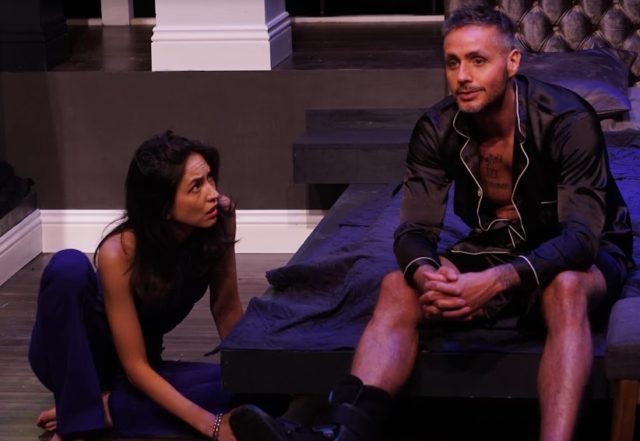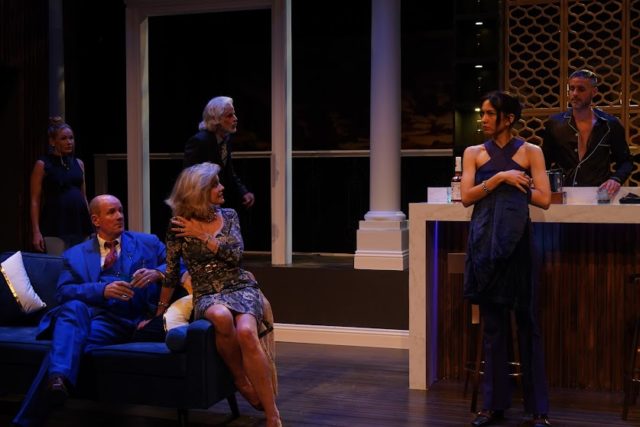
Maggie (Sonoya Mizuno) and Brick (Matt de Rogatis) have different plans for the future in Tennessee Williams classic (photo by Miles Skalli)
CAT ON A HOT TIN ROOF
Theatre at St. Clement’s
423 West Forty-Sixth St. between Ninth & Tenth Aves.
Wednesday – Monday through August 14, $39-$125
www.ruthstage.org
When I was on the high school tennis team, the coach, Mr. Spector, taught me to avoid getting caught in “no man’s land,” the midcourt area in between the service box and the baseline where it is most difficult to return volleys because the ball can come right at your feet or at your head, which forces you to awkwardly play the ball. Mr. Spector was also my tenth-grade English teacher. Although I don’t recall any classes on Mississippi-born playwright Tennessee Williams that year, I thought of Mr. Spector after watching Ruth Stage’s adaptation of Cat on a Hot Tin Roof, continuing at Theatre at St. Clement’s through August 14.
In October 2019, the troupe presented an alternate take on The Glass Menagerie at the Wild Project, directed by Austin Pendleton and Peter Bloch and starring Ginger Grace as Amanda Wingfield, company creative director Matt de Rogatis as Tom, Alexandra Rose as Laura, and Spencer Scott as the Gentleman Caller. Ruth Stage, with much of that same team, is now following that up with a unique version of Cat, the first-ever off-Broadway production approved by the Williams estate of the three-act 1955 Pulitzer Prize winner. Unfortunately, it spends too much of its 165 minutes (with an intermission and a pause) caught in a theatrical no man’s land.
Director Joe Rosario (Flowers for Algernon, The Exhibition) moves the time to the present, on a summer day when a family on a twenty-eight-thousand-acre cotton plantation is getting ready to celebrate patriarch Big Daddy Pollitt’s (Christian Jules Le Blanc) sixty-fifth birthday. The action takes place in the bedroom of Big Daddy’s ne’er-do-well son, Brick (de Rogatis), and his wife, Margaret (Sonoya Mizuno), aka Maggie the Cat. Following the death of his very close friend Skipper, Brick has become a drunk, refusing to sleep with Maggie, who wants to have a baby. The night before, trying to relive his high school glory days, Brick, heavily intoxicated, busted his ankle jumping hurdles and so he’s moving around in pain using a metal crutch and wearing a boot.
In the next room are Brick’s brother, Gooper (Scott), a lawyer who has been helping manage the estate, and his catty wife, Mae (Tiffan Borelli), who is pregnant with their sixth child. Two of their kids, Trixie and Dixie (Rose and Carly Gold), wander around the mansion in their own world; Maggie refers to them as the no-neck monsters. A report from Doc Baugh (Pendleton) reveals that Big Daddy is dying of cancer, setting in motion a battle for his money and control of the plantation. They have all chosen not to tell Big Daddy or Big Mama (Alison Fraser) about the terminal illness; instead, they are told that he has a spastic colon. As the evening goes on, the family dysfunction ratchets up with pointed hostilities emanating from just about everyone except Rev. Tooker (Milton Elliott), who is in over his head with the Pollitts.

Big Daddy’s (Christian Jules Le Blanc) birthday party goes awry in Cat on a Hot Tin Roof (photo by Miles Skalli)
Despite admirable qualities, this Cat is stuck in no man’s land from the very start. The play opens with the heavily tattooed Brick taking a shower behind the bar while Maggie applies makeup at her vanity. They are both superhot, eye candy no matter your orientation, but they lack the fiery chemistry demanded for their failing relationship. While de Rogatis does a lot of grunting — alcohol does not seem to lessen Brick’s constant pain, at least part of which is psychological — Mizuno speaks softly, sometimes in a whisper that is hard to hear. When Maggie says about Gooper and Mae, “Of course it’s comical but it’s also disgusting since it’s so obvious what they’re up to!” Brick responds, “What are they up to, Maggie?,” which is the audience’s response as well, because not everything Mizuno just said was clear.
In fact, all of the actors speak at different levels throughout; combined with their seemingly random costumes and shifting accents, it’s like they’re all in separate versions of the play, each in their own no man’s land. Even the set itself is hard to figure out; while there is a door to the bedroom that Big Mama never wants to be locked, there are also two empty white doorframes that lead to a back veranda that anyone can use to enter the room whenever they want.
The nods to the present day are confusing and seemingly random as well. There’s a loud cordless phone in the room that rings a few times, which at first sounds like an audience member’s phone going off. During the party, Gooper pulls out a cell phone to take a family photo, but that’s the only appearance of such a device.
One of the no-neck monsters wears bulky headphones instead of earbuds, listening to contemporary pop tunes. Brick might believe he is deserving of his hurting ankle, but there is no talk of any kind of painkillers that could help him. Even though Big Daddy is worth more than one hundred million dollars, there is no discussion of second opinions or getting the best doctors in the world to treat him. Along similar lines, no one mentions to Brick and Maggie that they could try alternative methods of getting pregnant, including IVF.
One of the toughest problems facing many twenty-first-century productions of Williams is how to make the homophobia that drives so much of the action and so many of his characters understandable to a modern audience. The fear and shame that hover over the Pollitts because of what occurred between Brick and Skipper feels out of date, especially because the family does not seem to be bigoted. While homosexuality was certainly a controversial issue in the 1950s (and remains so today, though not nearly as hidden), it would not be handled with the same language or emphasis in 2022. And for a bonus contemporizing effect, there are a bunch of F-bombs dropped like the fireworks that later explode in the night sky over a projection beyond the veranda.
Le Blanc, who has won three Daytime Emmys for his portrayal of Michael Baldwin on The Young and the Restless, a role he has played for more than thirty years, stands out among the cast as a trimmed-down, bushy-haired Big Daddy. He speaks with bold authority, his accent consistent, his words artistically enunciated; when he’s onstage, you can’t take your eyes off him. He’s the only one Mr. Spector wouldn’t have to shout at to get out of that treacherous no man’s land.